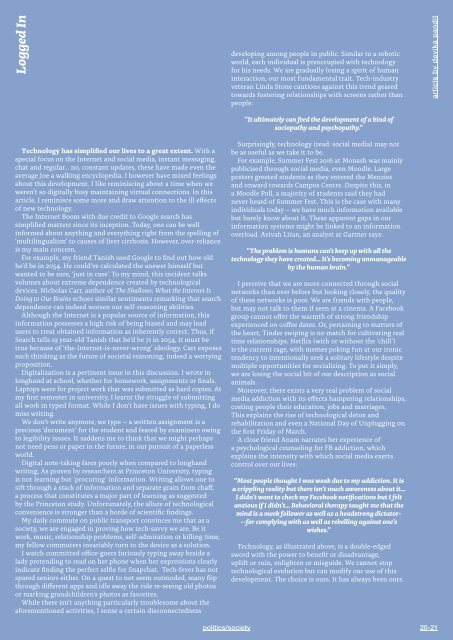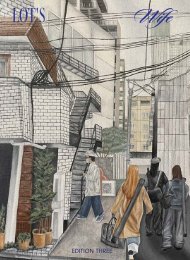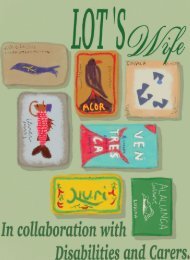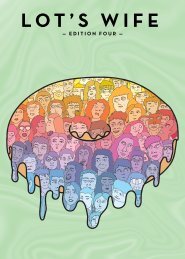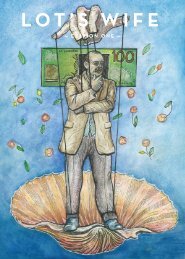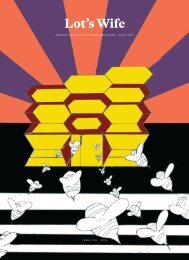Lot's Wife Edition 1 2017
Create successful ePaper yourself
Turn your PDF publications into a flip-book with our unique Google optimized e-Paper software.
Logged In<br />
developing among people in public. Similar to a robotic<br />
world, each individual is preoccupied with technology<br />
for his needs. We are gradually losing a spirit of human<br />
interaction, our most fundamental trait. Tech-industry<br />
veteran Linda Stone cautions against this trend geared<br />
towards fostering relationships with screens rather than<br />
people:<br />
article by devika pandit<br />
Technology has simplified our lives to a great extent. With a<br />
special focus on the Internet and social media, instant messaging,<br />
chat and regular… no, constant updates, these have made even the<br />
average Joe a walking encyclopedia. I however have mixed feelings<br />
about this development. I like reminiscing about a time when we<br />
weren’t so digitally busy maintaining virtual connections. In this<br />
article, I reminisce some more and draw attention to the ill effects<br />
of new technology.<br />
The Internet Boom with due credit to Google search has<br />
simplified matters since its inception. Today, one can be well<br />
informed about anything and everything right from the spelling of<br />
‘multilingualism’ to causes of liver cirrhosis. However, over-reliance<br />
is my main concern.<br />
For example, my friend Tanish used Google to find out how old<br />
he’d be in 2054. He could’ve calculated the answer himself but<br />
wanted to be sure, ‘just in case’. To my mind, this incident talks<br />
volumes about extreme dependence created by technological<br />
devices. Nicholas Carr, author of The Shallows: What the Internet Is<br />
Doing to Our Brains echoes similar sentiments remarking that search<br />
dependence can indeed worsen our self-reasoning abilities.<br />
Although the Internet is a popular source of information, this<br />
information possesses a high risk of being biased and may lead<br />
users to treat obtained information as inherently correct. Thus, if<br />
Search tells 19 year-old Tanish that he’d be 71 in 2054, it must be<br />
true because of ‘the-Internet-is-never-wrong’ ideology. Carr exposes<br />
such thinking as the future of societal reasoning, indeed a worrying<br />
proposition.<br />
Digitalization is a pertinent issue in this discussion. I wrote in<br />
longhand at school, whether for homework, assignments or finals.<br />
Laptops were for project work that was submitted as hard copies. At<br />
my first semester in university, I learnt the struggle of submitting<br />
all work in typed format. While I don’t have issues with typing, I do<br />
miss writing.<br />
We don’t write anymore, we type – a written assignment is a<br />
precious ‘document’ for the student and feared by examiners owing<br />
to legibility issues. It saddens me to think that we might perhaps<br />
not need pens or paper in the future, in our pursuit of a paperless<br />
world.<br />
Digital note-taking fares poorly when compared to longhand<br />
writing. As proven by researchers at Princeton University, typing<br />
is not learning but ‘procuring’ information. Writing allows one to<br />
sift through a stack of information and separate grain from chaff,<br />
a process that constitutes a major part of learning as suggested<br />
by the Princeton study. Unfortunately, the allure of technological<br />
convenience is stronger than a horde of scientific findings.<br />
My daily commute on public transport convinces me that as a<br />
society, we are engaged in proving how tech-savvy we are. Be it<br />
work, music, relationship problems, self-admiration or killing time,<br />
my fellow commuters invariably turn to the device as a solution.<br />
I watch committed office-goers furiously typing away beside a<br />
lady pretending to read on her phone when her expressions clearly<br />
indicate finding the perfect selfie for Snapchat. Tech-fever has not<br />
spared seniors either. On a quest to not seem outmoded, many flip<br />
through different apps and idle away the ride re-seeing old photos<br />
or marking grandchildren’s photos as favorites.<br />
While there isn’t anything particularly troublesome about the<br />
aforementioned activities, I sense a certain disconnectedness<br />
“It ultimately can feed the development of a kind of<br />
sociopathy and psychopathy.”<br />
Surprisingly, technology (read: social media) may not<br />
be as useful as we take it to be.<br />
For example, Summer Fest 2016 at Monash was mainly<br />
publicised through social media, even Moodle. Large<br />
posters greeted students as they entered the Menzies<br />
and onward towards Campus Centre. Despite this, in<br />
a Moodle Poll, a majority of students said they had<br />
never heard of Summer Fest. This is the case with many<br />
individuals today – we have much information available<br />
but barely know about it. These apparent gaps in our<br />
information systems might be linked to an information<br />
overload. Avivah Litan, an analyst at Gartner says:<br />
“The problem is humans can't keep up with all the<br />
technology they have created… It's becoming unmanageable<br />
by the human brain.”<br />
I perceive that we are more connected through social<br />
networks than ever before but looking closely, the quality<br />
of these networks is poor. We are friends with people,<br />
but may not talk to them if seen at a cinema. A Facebook<br />
group cannot offer the warmth of strong friendship<br />
experienced on coffee dates. Or, pertaining to matters of<br />
the heart, Tinder swiping is no match for cultivating real<br />
time relationships. Netflix (with or without the ‘chill’)<br />
is the current rage, with memes poking fun at our ironic<br />
tendency to intentionally seek a solitary lifestyle despite<br />
multiple opportunities for socializing. To put it simply,<br />
we are losing the social bit of our description as social<br />
animals.<br />
Moreover, there exists a very real problem of social<br />
media addiction with its effects hampering relationships,<br />
costing people their education, jobs and marriages.<br />
This explains the rise of technological detox and<br />
rehabilitation and even a National Day of Unplugging on<br />
the first Friday of March.<br />
A close friend Anam narrates her experience of<br />
a psychological counseling for FB addiction, which<br />
explains the intensity with which social media exerts<br />
control over our lives:<br />
“Most people thought I was weak due to my addiction. It is<br />
a crippling reality but there isn’t much awareness about it…<br />
I didn’t want to check my Facebook notifications but I felt<br />
anxious if I didn’t… Behavioral therapy taught me that the<br />
mind is a meek follower as well as a headstrong dictator-<br />
--for complying with as well as rebelling against one’s<br />
wishes.”<br />
Technology, as illustrated above, is a double-edged<br />
sword with the power to benefit or disadvantage,<br />
uplift or ruin, enlighten or misguide. We cannot stop<br />
technological evolution but can modify our use of this<br />
development. The choice is ours. It has always been ours.<br />
politics/society<br />
20-21


